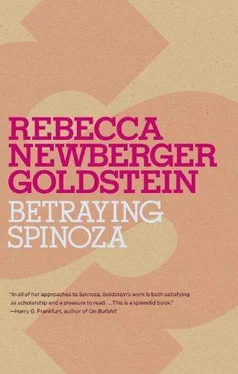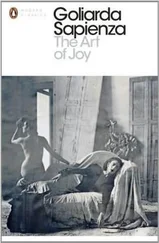Rebecca Goldstein - Betraying Spinoza - The Renegade Jew Who Gave Us Modernity
Здесь есть возможность читать онлайн «Rebecca Goldstein - Betraying Spinoza - The Renegade Jew Who Gave Us Modernity» весь текст электронной книги совершенно бесплатно (целиком полную версию без сокращений). В некоторых случаях можно слушать аудио, скачать через торрент в формате fb2 и присутствует краткое содержание. Год выпуска: 2009, ISBN: 2009, Издательство: Random House, Inc., Жанр: Биографии и Мемуары, на английском языке. Описание произведения, (предисловие) а так же отзывы посетителей доступны на портале библиотеки ЛибКат.
- Название:Betraying Spinoza: The Renegade Jew Who Gave Us Modernity
- Автор:
- Издательство:Random House, Inc.
- Жанр:
- Год:2009
- ISBN:978-0-80524273-7
- Рейтинг книги:5 / 5. Голосов: 1
-
Избранное:Добавить в избранное
- Отзывы:
-
Ваша оценка:
- 100
- 1
- 2
- 3
- 4
- 5
Betraying Spinoza: The Renegade Jew Who Gave Us Modernity: краткое содержание, описание и аннотация
Предлагаем к чтению аннотацию, описание, краткое содержание или предисловие (зависит от того, что написал сам автор книги «Betraying Spinoza: The Renegade Jew Who Gave Us Modernity»). Если вы не нашли необходимую информацию о книге — напишите в комментариях, мы постараемся отыскать её.
Betraying Spinoza: The Renegade Jew Who Gave Us Modernity — читать онлайн бесплатно полную книгу (весь текст) целиком
Ниже представлен текст книги, разбитый по страницам. Система сохранения места последней прочитанной страницы, позволяет с удобством читать онлайн бесплатно книгу «Betraying Spinoza: The Renegade Jew Who Gave Us Modernity», без необходимости каждый раз заново искать на чём Вы остановились. Поставьте закладку, и сможете в любой момент перейти на страницу, на которой закончили чтение.
Интервал:
Закладка:
Spinoza, my teacher reiterated, was an atheist, even though when the Amsterdam community excommunicated him he hadn’t yet revealed the full extent of his godless immorality. He had left the yeshiva when he was a teenager. We don’t know why exactly, since a student of his caliber would have been expected to go on and get smikha (the ordination for the rabbinate). His teachers, including Rabbi Morteira, an Ashkenazic scholar who had come from Vienna to lead this Sephardic congregation ( Ashkenaz means “Germany” in Hebrew), had permitted themselves to indulge the highest expectations for him, a true talmid khokhem (a gifted scholar, literally a “disciple of the wise”), emerging out of this community of first-and second-generation former Marranos. But Spinoza left the yeshiva and instead went into his father’s business, importing dry fruits. Maybe his father’s business was suffering and he had to help him out — his younger brother also went into the family business — or maybe, despite his brilliance in the yeshiva, he had already begun to think like an apikorus and that’s why he didn’t pursue his yeshiva studies.
He hadn’t yet published any of his blasphemous works when he was put into kherem , but he had spoken to people about some of his ideas. It was a very close community, as you can well imagine, girls, since such hardship as they had suffered, and over generations, make for very strong bonds. They had clung to Yiddishkeit under cover of silence and secrecy, risking their lives, but much had been lost, forgotten, sometimes confused with Christian beliefs. Some of the Sunday prayers of the Christians had gotten mixed up into their own liturgy. They would refer to Queen Esther (the heroine behind the Jewish festival of Purim) as St. Esther, just like the Catholics, who have official saints. Now they were relearning what it means to be good Jews, the centerpiece of their efforts being the yeshiva, the Talmud Torah, where Baruch had studied. Because of his brilliance, people were interested in him, in what he thought.
But soon rumors of Spinoza’s strange ideas began to emerge, so that his community began to be afraid for him and also afraid of him. Some of his former schoolmates from the yeshiva, knowing how he was straying into alien goyisha ideas, asked him whether he thought, as they had heard he did, that God is made out of matter, and that there are no angels, and that the soul isn’t immortal. Remember, girls, that Maimonides, the greatest Jewish philosopher of all time, had laid it down in his Thirteen Articles of Faith that we must never think of God in bodily terms and that we must believe in tekhiyas ha-maysim , the resurrection of the dead.
Think about it, girls: Of course the soul must be immortal, must survive bodily death; otherwise, how could there be an olam haba —a world-to-come? And if there is no olam haba , then how can the soul come before the Ultimate Judge and be held accountable for its conduct during its life? How could the good who had suffered during their lives receive their reward, and how could those who were evil and had gotten away with it get their divine punishment? Think of the tzadikim (the righteous) who died in Hitler’s ovens. Think of the innocent children. And think of the Nazis who escaped, who are enjoying life right now in Europe or South America. Without olam haba , we can’t make any moral sense out of the world; without olam haba , there is no moral sense to the world. This is why denying the soul’s immortality is tantamount to denying Ha-Shem .
Spinoza tried to evade the young men who asked him his views, and when they continued to press him, he used his Torah learning to confuse and mislead, making it seem as if he were still a good Jew, citing the Torah. He said that since the Torah says nothing about noncorporeality we are free to believe that God has a body; and also that the Torah says nothing about the creation of angels, which is why the Sadducees 4were never declared heretics even though they didn’t believe in angels. As for his thoughts on immortality, here Baruch let slip out probably more than he intended. He argued that the Torah uses the Hebrew words for “soul”— ruakh or nefesh or neshama —only to mean life or anything that is living, and that it nowhere commits us to believing that the soul survives the body’s death. On the contrary, he said, there are many places in the Torah where the exact opposite of immortality can be shown, and nothing is easier than to prove this.
When word of Spinoza’s ideas got back to the rabbis, they were stricken with horror. Here was one of their most brilliant students spouting ideas that not even the non-Jewish apikorsim would dare to contemplate. It was terrible to think that a boy who had shown so much promise and who had received such a fine education from the best rabbis in the community — learned rabbis, who had published books of their own — could reject everything. And the community also had to worry about what the goyim would think if word got out that such a wild heretic was living among them.
Remember, girls, these were former Marranos who had seen the very worst of what Christian intolerance can mean for the Jews. Amsterdam was a relatively tolerant city, Protestant rather than Catholic. Still, who knew how far their tolerance could be extended? It was true that the seventeenth-century Dutch were a very practical society, concerned at least as much with their economy as with their theology, and this practicality was good for the Jews. At the time of Spinoza’s birth, 1632, the Jews had been living in Amsterdam only a few decades, but they were already contributing to the thriving Dutch economy, using their connections to other Marranos scattered around the world, including those still back in Spain and Portugal, to import and export. Still, there were Protestant theologians even in Amsterdam, particularly the Protestants known as “Calvinists,” who weren’t thrilled about the Jewish newcomers. The Calvinists were not as tolerant as some of the other Protestant sects. And it had been a condition of the Jews being allowed to reside in Amsterdam — because, of course, they had had to get official permission — that they keep order and decorum among their own, in regard not only to behavior but to beliefs as well. Strangely enough, the Dutch authorities wanted the Amsterdam Jews to abide by the Torah. They wanted Amsterdam’s Jews to be frum (pious).
So the community leaders approached Spinoza and gently tried to change his mind. When he showed his stubborn arrogance, they begged him at the least to keep his ideas to himself, lest the Christian authorities learn of them and bring sanctions against the whole community. But apparently it did no good. The community met together in the synagogue. It was the parnassim , the community’s lay leaders, who, strictly speaking, had the power of excommunication, rather than the rabbis. The rabbis were also present in the synagogue, except for the chief rabbi, Rabbi Morteira, who had an obligation elsewhere. 5The community met to give Spinoza an opportunity to answer his accusers.
The two young men who had questioned Spinoza stood before the congregation and told them that they had spoken with Spinoza several times and that his views were full of heresies, and that he didn’t deserve to be held in such high esteem as a brilliant scholar by his former teachers. They said that Spinoza had spoken of the Jews as “a superstitious people born and bred in ignorance, who do not know what God is, and who nevertheless have the audacity to speak of themselves as His people, to the disparagement of other nations.” 6Spinoza had said that so far as the authorship of the Torah was concerned, it had been by someone other than Moses. The Five Books of Moses, he was saying, weren’t written by Moses, but rather by someone who had come many generations later, and someone who had known more about politics than about religion. It would take only some small good sense to discover the imposture, this apikorus said, and whoever continued to believe in it was as naïve as the Jews of Moses’ time.
Читать дальшеИнтервал:
Закладка:
Похожие книги на «Betraying Spinoza: The Renegade Jew Who Gave Us Modernity»
Представляем Вашему вниманию похожие книги на «Betraying Spinoza: The Renegade Jew Who Gave Us Modernity» списком для выбора. Мы отобрали схожую по названию и смыслу литературу в надежде предоставить читателям больше вариантов отыскать новые, интересные, ещё непрочитанные произведения.
Обсуждение, отзывы о книге «Betraying Spinoza: The Renegade Jew Who Gave Us Modernity» и просто собственные мнения читателей. Оставьте ваши комментарии, напишите, что Вы думаете о произведении, его смысле или главных героях. Укажите что конкретно понравилось, а что нет, и почему Вы так считаете.












